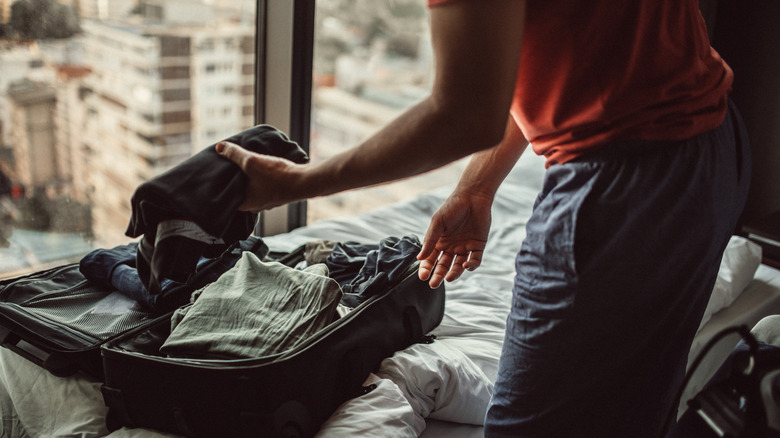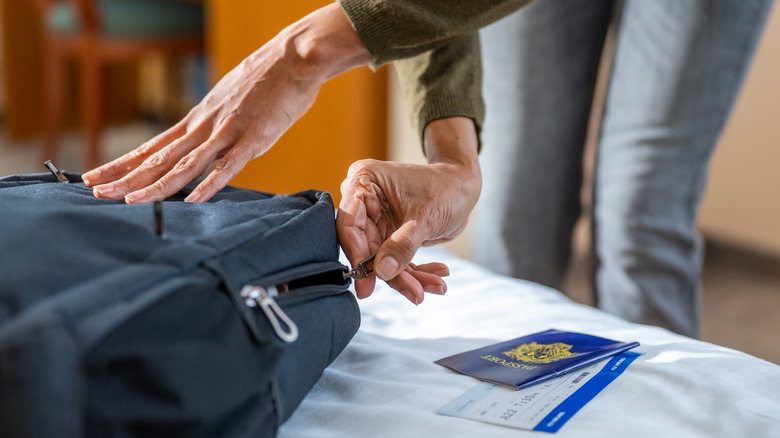Make Packing Easier With These Hacks From Rick Steves
TV personality and travel expert Rick Steves has spent the better part of the past four decades building a travel empire. The "Travel with Rick Steves" host, who describes himself as "America's most respected authority on European travel," has produced countless resources relating to traversing the globe, so you can trust that he knows a thing or two about packing smart.
In fact, Steves has long shied away from checking in luggage on his excursions and advises fellow travelers to do the same. For him, the key to packing easier is packing less. "It's enlightened to pack light," he shared in his "Packing Light & Right" talk. "It's a blessing to pack light." He limits himself to a single carry-on. On his famous website, he shared that the best way to follow a similar approach is to perform a thorough assessment of the belongings you initially think are essential to your trip. Steves said that instead of gauging whether you'll use a specific item, ask yourself this question instead: "Will I use them enough to feel good about hauling them over the Swiss Alps?" After all, you only have so much space in your bag, so every item you decide to include needs to be justified.
Steves acknowledges that mastering packing takes practice, but it's not a Herculean task either. Aside from scrutinizing your stuff, he advises paring down your wardrobe, buying some essentials at your destination, and using tried-and-tested accessories like packing cubes, mesh bags, and compression bags.
Pack for the 'best-case scenario'
Rick Steves believes that a huge part of the reason why travelers fret about packing so much is the inclination to think that the worst could happen. Many are guilty of packing extras of everything, anticipating potential inconveniences. But Steves assures everyone that this is rarely the case. He recommends packing for what he calls the "best-case scenario." And if you run out of shampoo or deodorant mid-trip, for example, it's not the end of the world. You can simply buy them at your destination. Most tourist shops and hotels likely sell travel essentials, and on the off-chance that they don't, he advises taking it as an opportunity to visit local stores. You never know; you might just find something interesting aside from what you were looking for.
The same principle applies to clothing. You might feel the need to pack an extra set of jeans or a pair of trainers, but Steves assures that they're often unnecessary. In Rick's Packing List, he notes that in most cases, you would only need the following: five easily rollable shirts of the cotton variety, two pairs of pants or shorts, five sets of underwear and socks, a single pair of comfortable shoes, one sweater for layering, a water-resistant jacket, and streetwear that doubles as sleepwear. Throw in a scarf for style purposes, if you wish. Should you find these insufficient during your trip, remember: You can always buy something you need.
Pack the same things every time
Rick Steves purports that you can enjoy your travels more if you lighten your load. How? By sticking to the basics and bringing more or less the same things to every trip — regardless of length. Not only does this award you with extra mobility, but it also relieves you of the mental burden of having to think about what to pack each time. "If I'm going to Europe for two months or if I'm going on the road for a five-day lecture tour, I pack, you know, essentially the same. Just the clothes I need and my computer and toiletries," he told Under the Radar Mag. "I don't lay awake at night thinking about what else could I bring? I lay awake at night thinking what don't I need maybe."
Try assembling your bag in accordance with his packing list. If you still find space management challenging after doing so, he recommends using packing cubes to categorize and organize your stuff, compression bags for efficient space maximization, and mesh bags for stuffing underwear, toiletries, and small items to keep them easily accessible.
How do you know if you've succeeded in packing smart? Steves suggests simulating the tourist experience in your neighborhood with your packed bag in tow. If you can freely move around without feeling burdened for around an hour or so, give yourself a pat on the back. If not, you can always repack and try again.


